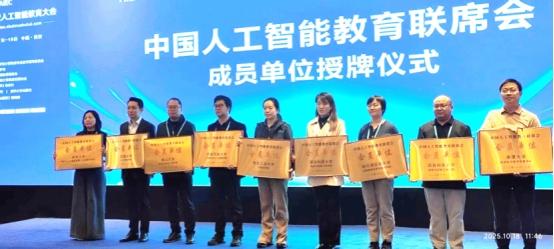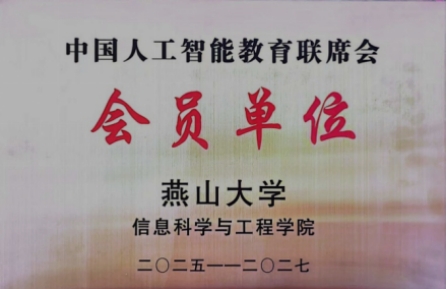The 2025 Artificial Intelligence Education Conference of China (AIEC 2025) convenes in Xi’an, Shaanxi Province, on October 18, bringing together leading academicians, AI experts, and educators from across the country. Jointly organized by the University Computer Course Teaching Steering Committee of the Ministry of Education and the China Artificial Intelligence Education Alliance (CAIEA), and hosted by Xi’an Jiaotong University, the conference features in-depth discussions on AI talent cultivation, curriculum development, the “101 Plan” for AI education, and industry-education integration. During the event, YSU’s School of Information Science and Engineering is officially admitted as a member of CAIEA, with Wu Peiliang, Head of the Department of Computer Science and Engineering, attending the plaque-awarding ceremony on behalf of YSU.

Plaque-awarding ceremony
Established in 2019 by nine leading universities, including Peking University and Tsinghua University, together with Tsinghua University Press, CAIEA drives national efforts to advance AI education and innovation. As a non-profit organization, it is dedicated to implementing China’s strategy for developing next-generation artificial intelligence and promoting the integration of “AI-powered education” and “education in AI”. The Alliance works to strengthen AI-related disciplines, modernize teaching models, expand the reach of AI education, improve educational quality, and foster collaboration between academia and industry to accelerate educational transformation.

CAIEA membership plaque
The School of Information Science and Engineering has gained national recognition as it joins CAIEA, underscoring its leadership in artificial intelligence education. The membership strengthens the School’s ties with China’s AI education community and opens new avenues for deeper industry-education collaboration, innovative talent development, and continued advancement of AI education at YSU.
As a CAIEA member, the School will stay at the forefront of industry trends and evolving talent demands while advancing comprehensive upgrades to its curriculum, teaching models, and faculty development to further enhance the quality of both general and specialized AI education. Looking ahead, it plans to enhance collaboration with fellow member institutions, deepen university-industry partnerships, and strengthen discipline development to further expand its influence in AI education and cultivate top-tier talent that supports China’s national strategies and regional innovation.